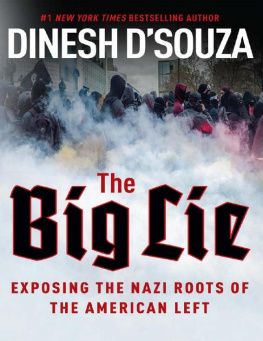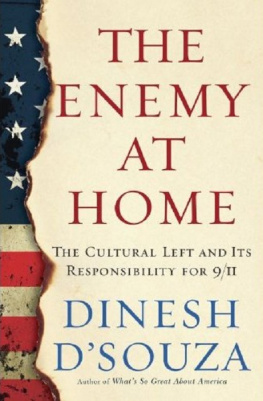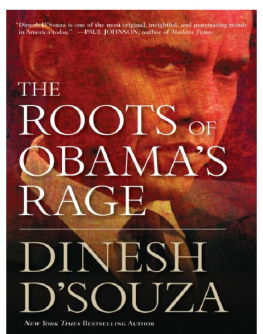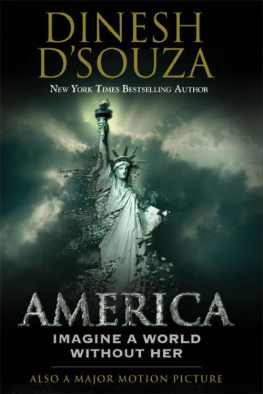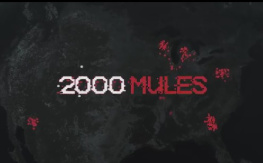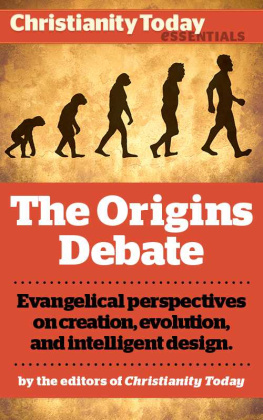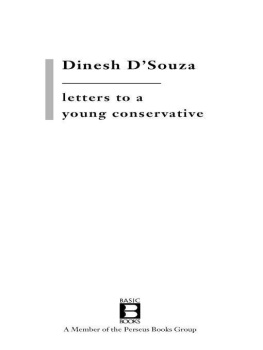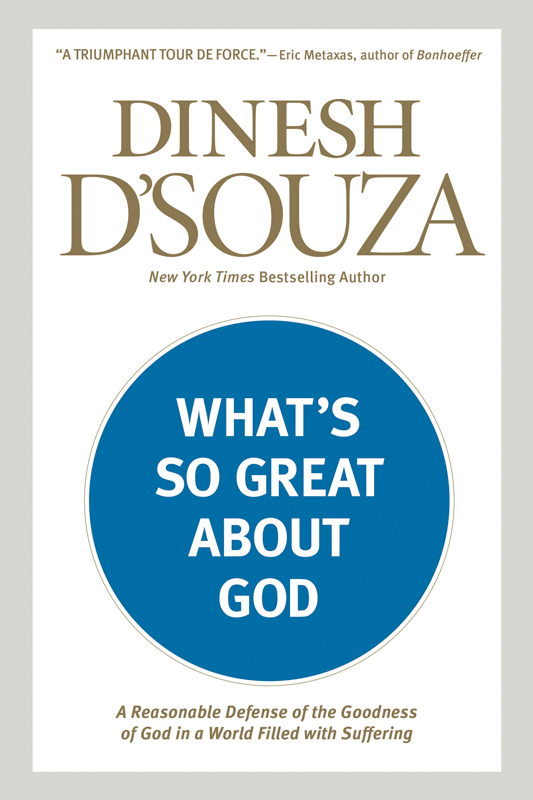Praise for Whats So Great about God
Atheists beware: this book contains incontrovertible evidence of a benevolent and omniscient Creator. What is that evidence? It is the spectacular mind of Dinesh DSouza. Believing such a mind could be the product of random forces would take infinitely more faith than believing in unicorns and leprechauns. A triumphant tour de force.
ERIC METAXAS
New York Times bestselling author of Bonhoeffer: Pastor, Martyr, Prophet, Spy
Dinesh DSouza examines the strengths and weaknesses of the historic approaches to the problem of suffering and offers some provocative suggestions based upon more recent ideas of fine-tuning and the Anthropic Principle. He tackles the challenges in a fair-minded way while offering direct answers to the arguments of todays anti-theists. The result is a readable and entertaining book.
IAN HUTCHINSON
physicist and professor of nuclear science and engineering at MIT
In addition to reviewing the classic explorations of this most vexing problem, Dinesh DSouza adds two provocative contributions: first, the perspective of a man born in India, a land that views suffering very differently from the West; second, an active engagement with the New Atheists, whom he counts as friends as well as debate partners.
PHILIP YANCEY
author of Whats So Amazing about Grace?
In this provocative and important book, Dinesh DSouza tackles the most difficult question of faith. Every reader, believer or not, will come away enriched, inspired, and compelled to rethink old assumptions.
RABBI DAVID WOLPE
author of Why Faith Matters
Visit Tyndale online at www.tyndale.com.
TYNDALE and Tyndales quill logo are registered trademarks of Tyndale House Publishers, Inc.
Whats So Great about God: A Reasonable Defense of the Goodness of God in a World Filled with Suffering
Copyright 2012 by Dinesh DSouza. All rights reserved.
Previously published in 2012 as Godforsaken: Bad things happen. Is there a God who cares? Yes. Heres proof. under ISBN 978-1-4143-2485-2.
Designed by Stephen Vosloo
Unless otherwise indicated, all Scripture quotations are taken from the Holy Bible, New Living Translation, copyright 1996, 2004, 2007 by Tyndale House Foundation. Used by permission of Tyndale House Publishers, Inc., Carol Stream, Illinois 60188. All rights reserved.
Scripture quotations marked NIV and appearing on the epigraph page are taken from the Holy Bible, New International Version, NIV. Copyright 1973, 1978, 1984, 2011 by Biblica, Inc. Used by permission of Zondervan. All rights reserved worldwide. www.zondervan.com.
Scripture quotations marked KJV are taken from the Holy Bible, King James Version.
Library of Congress Cataloging-in-Publication Data
DSouza, Dinesh, date.
[Godforsaken]
Whats so great about God : a reasonable defense of the goodness of God in a world filled with suffering / Dinesh DSouza.
pages cm
Rev. ed. of: Godforsaken. 2012.
Includes bibliographical references.
ISBN 978-1-4143-7964-7 (pbk.)
1. Suffering Religious aspects Christianity. 2. God (Christianity) Goodness. 3. Christian life. I. Title.
BV4909.D84 2013 231'.8 dc23 2013005364
ISBN 978-1-4143-7964-7 (sc)
ISBN 978-1-4143-8557-0 (ePub); ISBN 978-1-4143-8556-3 (Kindle); ISBN 978-1-4143-8558-7 (Apple)
Build: 2015-01-29 16:48:56
For Lee and Allie Hanley, whose love of our country and our Lord is a great inspiration to me
My God, my God, why have you forsaken me?
PSALM 22:1
CHAPTER 1
AN IMMIGRANTS JOURNEY
The Paradox of Suffering
That to the height of this great argument
I may assert Eternal Providence,
And justify the ways of God to men.
JOHN MILTON, PARADISE LOST
EACH ONE OF US, at some point in our lives, will find ourselves staring death in the face. None of us can escape that grim reality. Recently, I was reminded of that reality while reading the following e-mail from my friend, Devdas Kamath, who went to school with me in India but with whom I had lost contact over the years.
My elder son Nikhil, a first year student at the Indian Institute of Management, Ahmedabad, died of a rare disorder, Thrombotic Thrombocytopenic Purpura (TTP), at Ahmedabad on Tuesday, September 29. On Monday, September 21, Nikhil complained of fever. Since the fever did not subside with Crocin, he visited the doctor. He did not respond to the doctors treatment. Hence he was referred to a senior physician on Friday, September 25. He appeared to improve a bit by the same night. The next day, however, his condition had worsened, and he was admitted to SAL Hospital. At that time, I was in Mumbai. I managed to reach SAL Hospital around 7 p.m., while my wife Surekha reached from Chennai around 11 p.m. After a series of blood tests, the doctors concluded that Nikhil had contracted Thrombotic Thrombocytopenic Purpura, a blood disorder which causes blood in small vessels in the body to clot. The clots hamper the flow of blood to key organs. This leads to rapid deterioration and multiple organ failure. By the time the diagnosis was made, Nikhils condition had seriously deteriorated. He died around 7:20 p.m. on Tuesday, September 29.
I read the e-mail, and I burst into tears. To be honest, I didnt even know why I was crying. Devdas was my best friend in high school, but I hadnt been in touch with him since I came to America three decades ago. Obviously, I had never met his son. As the tears ran down my face, I felt almost embarrassed. Acutely I felt the contrast between Devdass stoic report of his sons death and my seemingly excessive reaction to it. As I thought about it, I realized I wasnt crying for the young man, but for his father. I was crying for my friends loss. And it came to me with a shock of discovery that I realized how much I loved this guy. Life had intervened since high school in such a way that I hadnt thought about him in years, yet the hurt I now felt over his loss was a measure of what, deep down, I truly felt about him. Since then we have restored our friendship, at least to the degree possible over a long distance. Remarkably, it was the death in his family that proved to be the catalyst for that restoration though obviously neither of us would have chosen the suffering.
Suffering is the theme of this book, and it is one that I have been thinking about my whole life, though mine has been a happy life. I grew up in a suburb of Bombay now called Mumbai and when I was nine years old, my grandfather died. I remember my grandmothers expression as she returned from the hospital. It was a defeated look, confirming the magnitude of her loss, and yet it was also defiant, as if she would not allow even this to break her dignity. I think this memory stands out for me, not because it was so painful, but because my life was so problem free that death came into it almost as an impostor, a misfit. Thats when I began noticing death lurking about, along with its siblings tragedy and suffering.
When I was about thirteen, a group of us went to the beach near my house, not a sand beach but the rocky entrance to the Arabian Sea. As we explored the crevices and small pools leading down to the ocean, one of my friends yelled out. He had spotted a tiny infant, probably only a few days old, floating faceup in the water. Whereas in America our first thought might have been foul play or an accident, as youths in India we had no doubt in our minds that some desperate mother had drowned her child to escape the shame of having him out of wedlock. We stared at the little corpse in horrid fascination, and then we turned and ran away. To this day I wonder occasionally about that young mother, how she must have felt to be driven to do that, and how as a consequence a little life was extinguished even before it had its chance.


